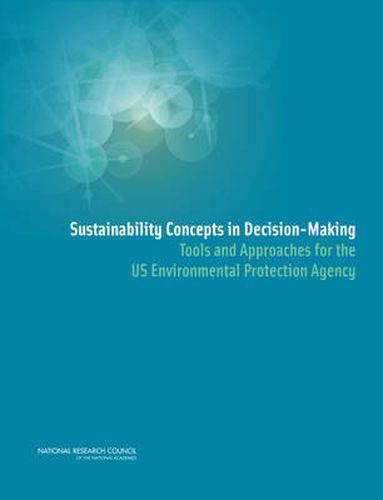Readings Newsletter
Become a Readings Member to make your shopping experience even easier.
Sign in or sign up for free!
You’re not far away from qualifying for FREE standard shipping within Australia
You’ve qualified for FREE standard shipping within Australia
The cart is loading…






In its current strategic plan, the U.S. Environmental Protection Agency (EPA) describes a cross-agency strategy to advance sustainable environmental outcomes and optimize economic and social outcomes through Agency decisions and actions. Sustainability has evolved from an aspiration to a growing body of practices. The evolution includes a transition from the development of broad goals toward the implementation of specific policies and programs for achieving them and the use of indicators and metrics for measuring progress. Without losing focus on implementing its existing regulatory mandates, EPA’s incorporation of sustainability considerations into its decision-making about potential environmental, social, and economic outcomes involves shifting from a focus on specific pollutants in an environmental medium (air, water, or land) to a broader assessment of interactions among human, natural, and manufactured systems. EPA has indicated that it will need to consider the use of a variety of analytic tools and approaches to assess the potential sustainability-related effects of its decisions and actions in response to complex environmental challenges.
Sustainability Concepts in Decision-Making: Tools and Approaches for the U.S. Environmental Protection Agency examines scientific tools and approaches for incorporating sustainability concepts into assessments used to support EPA decision making. Using specific case studies, this report considers the application of analytic and scientific tools, methods, and approaches presented in the 2011 NRC report Sustainability and the U.S. EPA. This report examines both currently available and emerging tools, methods, and approaches to find those most appropriate for assessing and/or evaluating potential economic, social and environmental outcomes within an EPA decision context. Sustainability Concepts in Decision Making also discusses data needs and post-decision evaluation of outcomes on dimensions of sustainability. A broad array of sustainability tools and approaches are suitable for assessing potential environmental, social, and economic outcomes in EPA’s decision-making context. The recommendations of this report will assist the agency to optimize environmental, social, and economic outcomes in EPA decisions.
$9.00 standard shipping within Australia
FREE standard shipping within Australia for orders over $100.00
Express & International shipping calculated at checkout
In its current strategic plan, the U.S. Environmental Protection Agency (EPA) describes a cross-agency strategy to advance sustainable environmental outcomes and optimize economic and social outcomes through Agency decisions and actions. Sustainability has evolved from an aspiration to a growing body of practices. The evolution includes a transition from the development of broad goals toward the implementation of specific policies and programs for achieving them and the use of indicators and metrics for measuring progress. Without losing focus on implementing its existing regulatory mandates, EPA’s incorporation of sustainability considerations into its decision-making about potential environmental, social, and economic outcomes involves shifting from a focus on specific pollutants in an environmental medium (air, water, or land) to a broader assessment of interactions among human, natural, and manufactured systems. EPA has indicated that it will need to consider the use of a variety of analytic tools and approaches to assess the potential sustainability-related effects of its decisions and actions in response to complex environmental challenges.
Sustainability Concepts in Decision-Making: Tools and Approaches for the U.S. Environmental Protection Agency examines scientific tools and approaches for incorporating sustainability concepts into assessments used to support EPA decision making. Using specific case studies, this report considers the application of analytic and scientific tools, methods, and approaches presented in the 2011 NRC report Sustainability and the U.S. EPA. This report examines both currently available and emerging tools, methods, and approaches to find those most appropriate for assessing and/or evaluating potential economic, social and environmental outcomes within an EPA decision context. Sustainability Concepts in Decision Making also discusses data needs and post-decision evaluation of outcomes on dimensions of sustainability. A broad array of sustainability tools and approaches are suitable for assessing potential environmental, social, and economic outcomes in EPA’s decision-making context. The recommendations of this report will assist the agency to optimize environmental, social, and economic outcomes in EPA decisions.